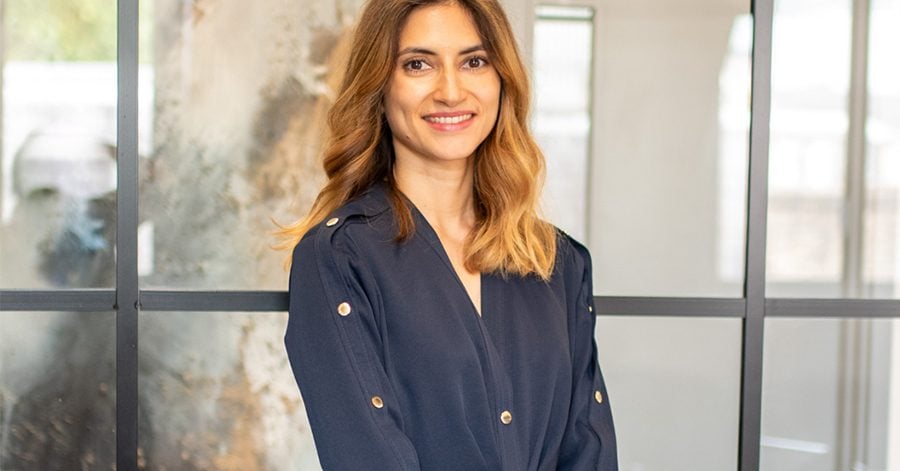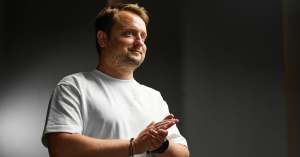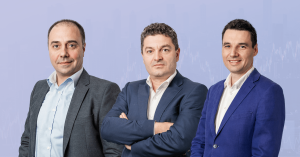Mina Mutafchieva Van Ingelgem is a Bulgarian-born Venture Capital investor that has recently become a partner at Dawn Capital, a London-based early-stage venture fund focusing on B2B software. She is the second female to hold this position, after Evgenia Plotnikova. In this interview, we will talk about the venture capital niche from a female perspective and some growth drivers in the SEE region.
Mutafchieva joined Dawn Capital in 2019 as Senior Principal. She has led investments of over €75M since then in the likes of Eigen Technologies, AccessFintech, LeanIX, and CluedIn, and manages VC and entrepreneur relationships in the Nordic markets. Her targets have been data analytics, fintech, and the future of work sectors.
Mutafchieva complements the Dawn team, which represents a group of 22 investors, entrepreneurs, strategists, and operational specialists, with a decade of growth capital and strategy consulting experience. Her experience was an asset for the company with launching Europe’s largest early-stage B2B software fund, Dawn IV, of over €330M.
Dawn has recently launched their latest $120M fund, Dawn Opportunities II. The fund will invest in the Series C+ rounds of the top-performing portfolio companies, enabling Dawn to stay with their companies for longer, as they go from strong, emerging players to global industry-defining titans.
The Recursive: What fresh perspective do you aim to bring with this position to the VCs niche?
Mina Mutafchieva: There are many ways to be a successful VC investor. Some people are focused on spotting talent and looking out for high-energy, smart, experienced people. Others think about the trends that we’re seeing, where value is going to be created in the future to build a disruptive business. Then, some are just good at sniffing out a really hot deal. I would say, for me, there is a combination of one and two.
I spent a lot of time thinking through how the world is shaping up. In Europe, I think that we’re still trying to figure out if we have to imitate the American VC model, which tends to be a bit more individualistic, or if we can find a more collaborative team-based approach, which is still fast, flexible, and hard-working. My view is that a great team is always better than a single individual.
What inspired you to go into venture capital?
Several things happened at the same time. I would say the number one reason was the people. My partners at Dawn are incredible, high achieving, but humble. They are all self-made, sort of hustlers, starting from relatively humble beginnings, and then creating something that, hopefully, will outlive us all. Their journey resonated with mine.
Then, another thing happened. I was working in private equity at the time, and I realized a lot of the cool companies I saw growing fast were actually out of reach for me. I realized I wanted to be involved much earlier and help in the building stages, see the full journey, which I find so exciting.
What were your thoughts before changing careers?
I spent a lot of time thinking about it. If you ask my partners at Dawn, they’ll say I spent forever, but it was very important. I wanted to ensure what I was committing to for the next 10-15 years. In the end, you make your lists and think about everything, but you kind of have to end up trusting your gut.
My husband took me aside and he said: ‘Okay, we have to go on holiday and you have to not think about this for three days. Then you have to see how you feel and what you want.’ It was somewhat of a risk at that time. The venture world wasn’t as big in the public eye as it is today. Even though it’s only two short years ago, so much has changed. It’s always a risk changing careers later in life, but it’s the best decision I’ve ever made.
Is the venture capital world an inclusive one for women?
At Dawn, we have 50% women in the firm and the investment team, but we are focusing on B2B technology, and that field is still relatively male-dominated. It would be great to see more female entrepreneurs. Out of 100s of startups that I see every year, I can count on my own two hands how many are started by women. That’s a big issue. There is still a lot of work for the tech sector and VCs to not just hire women, but also nurture them through the ranks and into leadership roles.
How do you think we can encourage more female entrepreneurs, the new wave of Generation Z members?
I was about 17 years old when I left Bulgaria. I don’t know how young girls are growing up now in Southeastern Europe today, but what I reflect on today is that I had to unlearn a lot about what I grew up with: “be the good girl”, “don’t get in the way”, “don’t interrupt”.
When I look at my American friends, and how “in-your-face” they are and how they just don’t care, I wish I was brought up like this, stating your case and not apologizing for being there. I think that’s where it starts, not teaching girls to be quiet.
What are you looking for in a startup founder?
I ask myself: ‘why is this the right person to build this product?’, “where did they get their inspiration?’, ‘was it rooted in something that they experienced in their life?’, ‘is that person good at attracting and retaining fantastic people around them?’.
The number one criteria that we use for evaluating our CEOs is how good they are at attracting amazing talent. There is no way you can do this on your own. We try to see how they are with their team. Who are they choosing to surround themselves with? Are they looking to get the best person for the job? Do they give a lot of space to these people to perform?
The last piece is resilience. One thing that’s 100% true of every startup, even the most successful ones, is that at some point, things get hard. And then you need to have that vision to say: ‘this is how we’re going to do it, we’re going to shift this or change that and hack it until we make it to the other side.’
What trends are you interested in for the following years?
Around 90% of companies have a current tech stack that has either been built in-house or is at least 10 years old, which is ancient in tech terms. A lot of trends are converging to bring huge disruption to this tech stack — rapid digitalization spurred on by Covid, continued innovation, and fragmentation of the payments landscape, so I find myself spending a lot of my time in B2B fintech and e-commerce, with many new data tools that enterprises need to handle huge amounts of data emerging.
Can you share with us some of the B2B software’s niche growth drivers in Europe?
One thing is the digitalization of commerce. This was something that was growing nicely, and then we had COVID. I have seen statistics that say we condensed 5-10 years of growth into one year in terms of how quickly people moved online.
I think Europe has reached this point where you have enough successful companies out there, with employees who made half a million or a million, and they can start building something on their own. I’m super excited about that. People don’t want to buy a house, they want to go and start a business.
We all live in this world that is cloud-enabled, and there is still a lot of money to be made helping that digital transformation along and making sure that people can put their data in the cloud. It sounds obvious, but it’s still only like 20%-30% data there. There’s still a long way to go for more traditional companies.
What do you believe is Southeast Europe’s potential as a tech hub and will you be taking an interest in the area?
Yeah, absolutely. We have always believed that there isn’t a monopoly on talent. Smart and ambitious people come from anywhere. In Southeast Europe, we have a very strong technical education, which is the start.
What is still missing in Southeast Europe is the commercial side of the equation. We can build a fantastic product here, but how do we market it and get it to customers? I think that COVID has been helpful with that. Because now nobody needs to sit across the table to buy your product.
I think all the ingredients are there. You need a consistent strategy because it’s a slow process. It’s about closing that commercial gap, which you can do in interesting ways now by getting champions to support the ecosystem.







